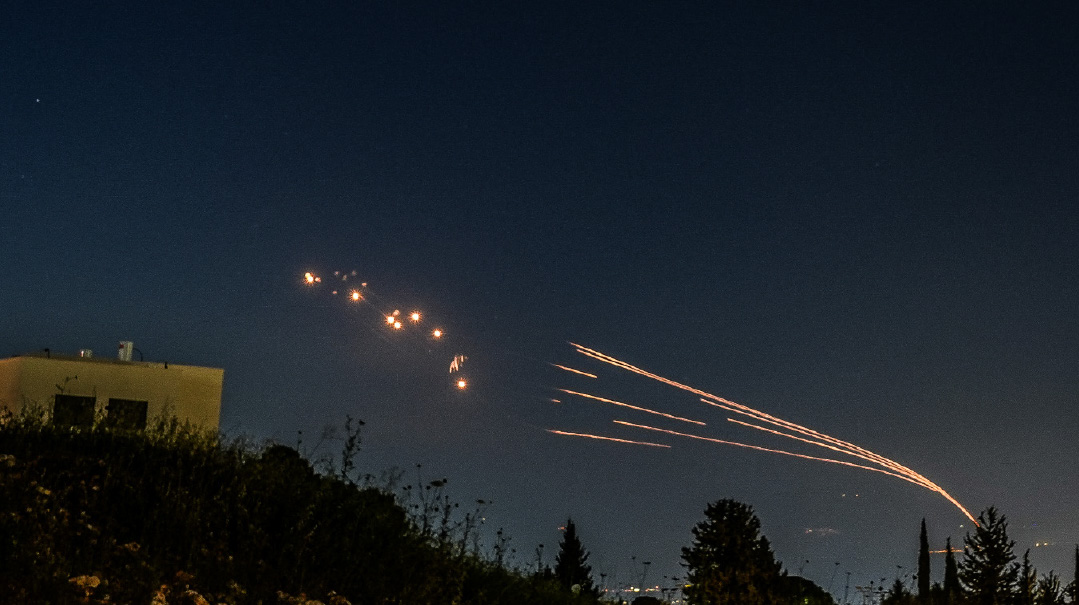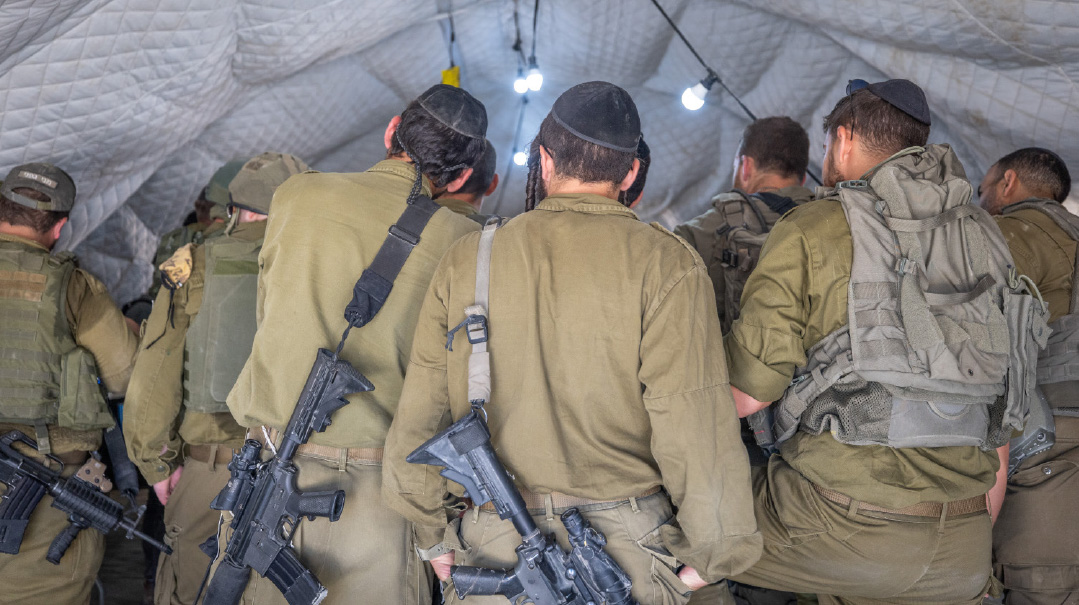Meaning in the Missiles

Whether we like it or not, we’ve been dragged from our complacency onto a higher plane of existence

Like a Pesach Sheini well past its sell-by date, this week I got a rare second chance — this time involving missiles, not matzah. Having failed to write about Iran’s midnight rocket assault back in April — which, along with most Israelis, I witnessed firsthand — allow me to share some thoughts on this week’s dramatic predawn, preemptive strike on Hezbollah, which I actually slept through.
What struck me once again in the aftermath of the Sunday morning attack was the thought that was uppermost in my mind a few months ago, as Iranian ballistic missiles exploded overhead, with the incongruently cheerful sound of a Geulah popcorn machine.
It was the sense of the deeply surreal nature of a war where the average citizen can track the progress of the missiles being fired at him.
At 9 p.m. that evening, Israelis were told that Iran had launched some 300 drones, cruise missiles, and ballistic missiles, and that their orderly arrival was expected over the next few hours. As clinically as if they were discussing the exit polls on election night, talking heads pointed to studio projections of the various projectiles and their ETAs.
“The drones take eight hours, the cruise missiles will arrive after a two-hour flight, and the ballistic missiles, which were launched much later, only need 12 minutes,” went the explanation.
Has there ever been a war like this? Back in 1815, news of Napoleon’s defeat at Waterloo took four days to travel the 250 miles to London. The advent of the telegraph made reporting of the American Civil War nearly instantaneous, and by World War II, reporters were embedded with the armies on all sides. Social media and open-source intelligence created the citizen journalism that is now a feature of modern war.
But as we joined everyone else on their balconies at 2 a.m. that night to see the missiles arrive bang on time, we witnessed something of a different order altogether. Because of the unprecedented access to real-time information, it was like watching a game on an old-fashioned computer arcade — except that we were the little characters inside.
What to make of the sheer, lunatic immediacy of the current war in which we’re now all, in a sense, on the front line?
The Chofetz Chaim famously observed that in terms of Divine hashgachah, technological advances are intended to strengthen our faith. So, the development of the telescope strengthened belief that Hashem is all-seeing, and the telephone taught that our prayers are heard at a vast distance, and so on. In search of the message of this terrifying new style of battle, two thoughts occur to me. One is that along with the fear engendered by the data flow comes a sense of clarity.
The two-sided coin of fear and clarity is central to the Yamim Noraim, when we long for a world of openly revealed Divine presence, with the words “Tein pachdecha… al kol maasecha, v’eimas’cha al kol mah shebarasa.” According to Rashi, the term “pachad” refers to an acute fear of a nearby threat, unlike the word “eimah,” which means alarm over a more distant, amorphous menace. The Vilna Gaon explains further that “Maasecha” — G-d’s Handiwork — is also a higher form of existence than the “bri’ah,” or creation, which is the corollary. In the context of the revelation of Divine power, the clearer the perception of Hashem’s greatness, the more intense the awe.
Watching our skies swept clear of aerial traffic on flight-tracking websites isn’t pleasant, but our heightened awareness means that — even distant from the battlefield — we have a real-time awareness of events that is unique, a pachad born of proximity.
For some reason, our generation has merited experiencing Hashem’s salvation in glorious technicolor, with an immediacy that was never possible before. As we walk away practically untouched from a rain of ballistic missiles — or as was the case this week with the missiles destroyed on their launchpads — we confront our own dependence in a way that feels entirely new. In that challenge, there’s also a demand, and a privilege, of living with some higher form of awareness.
The other thought that comes back to me when the missiles boom is a perspective on the miraculous, courtesy of Ari Sacher, an American engineer on the team responsible for developing the Iron Dome.
A number of years ago, I brought Ari in to speak at our Tel Aviv outreach program, and I’ve never forgotten his powerful words.
“Who believes the story of the Hamas rocket that was fired at the Azrieli Towers, was missed by two Iron Dome interceptors, and was finally blown into the sea by a freak wind?” he asked, referring to a story that went viral about a decade ago.
To my surprise, about half of the audience put up their hands, to which the engineer responded by debunking the entire tale.
“If the wind had been powerful enough to hurl a missile two miles from the center of Tel Aviv into the sea, it would have thrown the skyscrapers across town as well,” he explained — and then went on to say why it didn’t matter.
Why are we only excited by open miracles, and not by the hidden miracle of the Iron Dome’s development? he asked. Far more powerful countries have thrown vast sums at missile defense systems that don’t work, and yet just in its time of greatest need, against all the odds, a small country manages to create a system that has become the envy of the world.
“The Iron Dome is a hidden miracle,” he concluded.
Looking back on the pre-Pesach showdown with Iran, it’s hard not to agree. For three decades, Israel’s top scientists labored to create a multilayer air-defense system, including the Arrow, David’s Sling, and Iron Dome systems to counter everything from ballistic missiles to rockets.
They deserve an A-for-effort, but as every high school student knows, hard work doesn’t always pay off. Military technology goes wrong all the time, often with deadly results. What if one of those systems had proved faulty, leaking a higher percentage of missiles? What mayhem would those lethal popcorns have delivered if Israel hadn’t — quite extraordinarily — cracked the code of missile defense? Who gave all those Jewish heads their Jewish wisdom just when we needed it most?
Say what you will, I’m with Ari Sacher on this one: The Iron Dome et al are a walking, gum-chewing example of a hidden miracle — when the Hidden Hand intervenes to make things go right for us.
As another round of tense brinksmanship with Hezbollah winds down, it’s hard to see where we go from here, living siren to siren, on the edge of regional war.
One thing is clear: Whether we like it or not, we’ve been dragged from our complacency onto a higher plane of existence. Wherever in the Jewish world we breathlessly track the missiles and jets, we’re witness to Divine intervention painted in every elegant vapor trail.
(Originally featured in Mishpacha, Issue 1026)
Oops! We could not locate your form.







